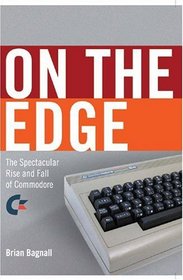The introduction to the book sets the tone, when the author laments how most of the other computer histories in books and movies get it wrong, giving too much credit to other companies like Apple for the success of the personal computing revolution. That's a valid point. But As I've started to read the first hundred pages or so, a pattern emerged. The following occurs so many times, we can call the book formulaic:
"Book xxx says that the following thing happened. But it's wrong, and here's a quote from Chuck Peddle as proof."
"Here's a quote by an industry insider xxx, who says that the following thing happened. But it's wrong, and here's a quote from Chuck Peddle as proof."
The book reads more as an autobiography of Chuck than anything else. I can't get past the first 150 pages without having read a few hundred quotes from him, with only about a dozen quotes from other sources mixed in.
Also, the book takes the opportunity to bad-mouth Apple at every opportunity. The author really has some anger issues to work out.
Well, that, and the poor grammar and lack of editing. The wrong usage of the word "you're/your" and incorrect use of an apostrophe ("the two Steve's" used in a non-possessive context) within the first 60 pages detract from what might be valid points.
I wanted to like this book, to read something that offered a look at a company that wasn't Microsoft or Apple during those years. But the angry tone and bias of this book weaken what could have been an effective rewrite of history.
"Book xxx says that the following thing happened. But it's wrong, and here's a quote from Chuck Peddle as proof."
"Here's a quote by an industry insider xxx, who says that the following thing happened. But it's wrong, and here's a quote from Chuck Peddle as proof."
The book reads more as an autobiography of Chuck than anything else. I can't get past the first 150 pages without having read a few hundred quotes from him, with only about a dozen quotes from other sources mixed in.
Also, the book takes the opportunity to bad-mouth Apple at every opportunity. The author really has some anger issues to work out.
Well, that, and the poor grammar and lack of editing. The wrong usage of the word "you're/your" and incorrect use of an apostrophe ("the two Steve's" used in a non-possessive context) within the first 60 pages detract from what might be valid points.
I wanted to like this book, to read something that offered a look at a company that wasn't Microsoft or Apple during those years. But the angry tone and bias of this book weaken what could have been an effective rewrite of history.




